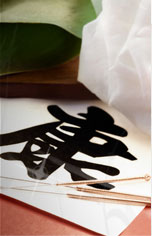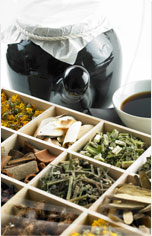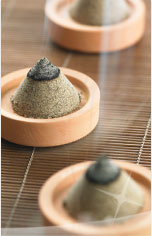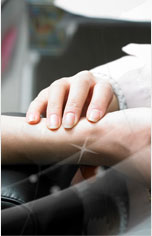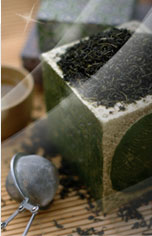| |
Acupuncture and Chinese Herbs for Insomnia |
|
Insomnia is a common sleep disorder in which you have trouble falling and/or staying asleep. Chronic insomnia is usually a result of stress, life events or habits that disrupt sleep, such as irregular bedtime schedule, naps, stimulating activities before bed, or eating too much at night. Chronic insomnia may also be associated with medical conditions such as anxiety, depression, chronic pain, cancer or hyperthyroidism as well as the use of certain medications.
Sleep is as important to your health as a healthy diet and regular physical activity. Lack of quality sleep can cause problems such as difficulty concentrating, diminished energy, low mood, and trouble performing everyday tasks. Since sleep strengthens the immune system, insomnia can leave you susceptible to many other health concerns.
Changing sleep habits and addressing any issues that may be associated with insomnia, such as stress, medical conditions or medications, can restore restful sleep for many people. If these measures don’t work, your doctor may recommend cognitive-behavioral therapy, medications, or both, to help improve relaxation and sleep.
|
|
Symptoms of Insomnia
- Difficulty falling asleep at night
- Waking up during the night
- Waking up too early
- Not feeling well-rested after a night's sleep
- Daytime tiredness or sleepiness
- Irritability, depression or anxiety
- Difficulty focusing on tasks or remembering
- Increased errors or accidents
- Ongoing worries about sleep
|
Insomnia in TCM
In TCM, insomnia is a manifestation of a Shen (spirit) disorder caused by various internal disharmonies making the spirit restless. Shen plays a key role in higher and mental functions, including many of the intellectual and spiritual aspects of consciousness. Shen is most closely associated with our conscious awareness, and is essentially our ability to perceive, interact, and communicate with our world clearly.
TCM believed that insomnia occurs 1) when Shen is not adequately anchored and secured due to lock of nourishment by Qi (the vital energy of the body), Blood and Essence (the refined and precious substance that is the material basis for all life), 2) when overstimulation and agitation prevent Shen from settling quietly at the time for sleep, or 3) when Shen is locked in and agitated by blockage of Qi and Blood.
The Heart houses Shen; the Kidneys store Essence and promotes transforming Essence into Marrow in Brain; the Spleen produces Qi and Blood, acting as the nourishing source of physical and mental activity; the Liver governs the flow of Qi and Blood. Insomnia may follow when any of these Zang Fu organs are not functioning properly because of poor diet, lock of activity, prolonged illness, congenital weakness, overwork, and medications. Insomnia may arise from emotional imbalances. For example, prolonged worry or anxiety causes Blood exhaustion, making the Blood unable to nourish Heart; anger and emotional depression can lead to inhibited flow of Qi and Blood.
|
TCM Treatment for Insomnia
Different treatment plans will be designed for each patient once a subtle pattern of disharmony is diagnosed after collecting clinical information on sleep pattern and lifestyle, degree of daytime fatigue, emotional and physical state, and medical history.
Since TCM regards insomnia as one of the signs of an internal disharmony, TCM treatment always aims at resuming harmonious functions of the diseased organs, ensuring a normal supply of the fundamental substances to rebalance the body.
As a patient's symptoms and issues change, the treatment will be adjusted accordingly. Healing time depends on the severity of symptoms and general health of the patient. Generally, insomnia has a good prognosis for most patients.
|
|
Types of Insomnia In TCM
- Difficulty falling asleep
- Difficulty staying asleep
- Waking up too early in the morning (2 - 4 am)
- Excessive wild dreaming
- Sleep-talking or sleepwalking
- Frequent awakening with palpitations or panic attack
|
Acupuncture
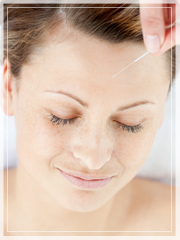
Acupuncture can treat insomnia by stimulating specific acupuncture points on the body with fine, sterile needles. Acupuncture relaxes the body and mind by promoting the smooth flow of Qi and restoring the balance of internal organs. By getting to the root of insomnia, acupuncture not only help with better sleep but also improve overall well-being.
A preliminary report in 2004 found that in patients with anxiety, acupuncture increased nighttime melatonin production and total sleep time. The patients who received acupuncture also fell asleep faster, were less aroused at night, and were less stressed.1
Several clinical studies have demonstrated that acupuncture has positive effects in treating insomnia by modulating a wide range of neuroendocrinological factors. Although further study is needed, evidence has suggested that the clinical efficacy of acupuncture in treatment of insomnia is potentially mediated by a variety of neurotransmitters including norepinephrine, melatonin, gamma-aminobutyric acid, and β-endorphin.2
Chinese Herbal Medicine
Besides acupuncture, Chinese herbal formulas are often prescribed to strengthen the mind, to resolve the blockage of Qi, and to restore the balance of internal organs.
The Chinese herbs used most often to treat insomnia are:
- Suan Zao Ren (Sour jujube seed)
- Bai Zi Ren (Chinese arborvitae kernel)
- Ye Jiao Teng (Tuber fleece flower stem)
- Yuan Zhi (Chinese senega)
- Fu Xiao Mai (Shriveled wheat)
- Wu Wei Zi (Schisandra)
Chinese herbs are usually used in a combination of 2 to 30 herbs and are customarily prescribed for each patient. Herbs can be administered to a patient in many forms. Raw herbs can be taken as a brewed tea form. This herb tea form is strong and quick acting; however, it takes time for cooking and preparation and the taste can be quite strong. The herbs can also be consumed in many other forms such as powder, capsule, pill, topical and tincture. Herbs possess many strengthening and therapeutic effects because of their content of various nutrients and vitamins, which are essential to the body. While Chinese herbal medicine can be very potent, it may take a few weeks to months before the full effects are noticed.
|
Lifestyle Tips
- Keep regular sleep hours
Going to bed and getting up at roughly the same time every day will programme your body to sleep better. Choose a time when you're likely to feel tired and sleepy.
- Limit naps
While napping seems like a proper way to catch up on missed sleep, napping can affect the quality of nighttime sleep. It is important to establish and maintain a regular sleep pattern. If you really need to nap, try to keep it short, less than 45 minutes.
- Make comfortable sleeping environment
Temperature, lighting, and noise should be controlled to make the bedroom conducive to falling and staying asleep. Your bed should feel comfortable - not too small or old; not too soft or too hard. If you have a pet that sleeps in the room with you, consider moving it somewhere else if it often disturbs you in the night.
- Exercise regularly
Regular exercise can improve sleep quality and duration. However, exercising immediately before bedtime can have a stimulant effect on the body and should be avoided.
- Limit caffeine, alcohol, and nicotine.
Cut down on caffeine in tea, coffee, energy drinks or sodas, especially in the evening. Caffeine may not only cause difficulty initiating sleep, but may also cause frequent awakenings. Alcohol may have a sedative effect for the first few hours following consumption, but it can lead to frequent arousals and a non-restful night’s sleep. Nicotine is a stimulant; smokers tend to take longer to fall asleep, wake up more frequently, and often have more disrupted sleep.
- Do not eat or drink right before bedtime
Eating a late dinner or snacking before going to bed can activate the digestive system and keep you up, especially if you suffer from heartburn or gastroesophageal reflux (GERD). Drinking a lot of fluids prior to bed can overwhelm the bladder, requiring frequent visits to the bathroom that disturb your sleep.
- Limit activities in bed
Associate the bedroom only with sleep and relaxation. Watching TV or working with a laptop can increase alertness and make it difficult to fall asleep.
- Try to relax before going to bed
Take a warm bath, meditate, or listen to quiet music to relax your mind and body before going to sleep.
- Write away your worries before bedtime
If you tend to lie in bed thinking about tomorrow, consider setting aside a period of time before bedtime to review the day and to make plans for the next day.
|
|
|

